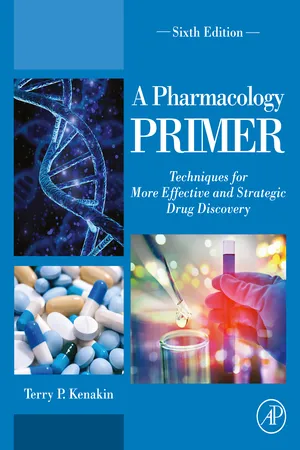
A Pharmacology Primer
Techniques for More Effective and Strategic Drug Discovery
- 502 pages
- English
- ePUB (mobile friendly)
- Available on iOS & Android
About This Book
A Pharmacology Primer: Techniques for More Effective and Strategic Drug Discovery, Sixth Edition features the latest research surrounding the application of pharmacology in drug discovery in an effort to equip readers with a deeper understanding of complex and rapid changes in this field. Written by well-respected pharmacologist, Terry P. Kenakin, this primer is an indispensable resource for anyone involved in drug discovery. This edition has been reorganized for better flow and clarity and includes material on new technologies for screening (virtual, DNA encoded libraires, fragment-based) and a major section on phenotypic (target agnostic) screening for new leads and determination of drug targets.
With full color illustrations as well as new examples throughout, this book remains a top reference for all industry and academic scientists and students directly involved in drug discovery or pharmacologic research. New material includes a discussion of the determination of target engagement, including numerous new ways to demonstrate the physical interaction of molecules with drug targets and new drug candidates such a mRNA, gene therapy, antibodies and information on CRISPR and genomics.
- Highlights changes surrounding the strategy of drug discovery, providing a comprehensive reference with advances in the methods involved in lead optimization and more effective drug discovery
- Includes multiple new sections on screening, phenotypic (target agnostic) screening for new leads, and determination of new drug targets
- Illustrates the application of rapid, inexpensive assays to predict activity in the therapeutic setting, showing data outcomes and the limitations inherent in interpreting this data
- Includes test questions and answers
Frequently asked questions
Information
Table of contents
- Cover image
- Title page
- Table of Contents
- HTU
- Copyright
- Dedication
- Preface to sixth edition
- Chapter 1. What is pharmacology?
- Chapter 2. How different tissues process drug response
- Chapter 3. Drug–receptor theory
- Chapter 4. Pharmacological assay formats: binding
- Chapter 5. Drug targets and drug-target molecules
- Chapter 6. Agonists: the measurement of affinity and efficacy in functional assays
- Chapter 7. Orthosteric drug antagonism
- Chapter 8. Allosteric modulation
- Chapter 9. The optimal design of pharmacological experiments
- Chapter 10. Pharmacokinetics
- Chapter 11. Safety pharmacology
- Chapter 12. The drug-discovery process
- Chapter 13. Selected pharmacological methods
- Appendix 1. Statistics
- Index